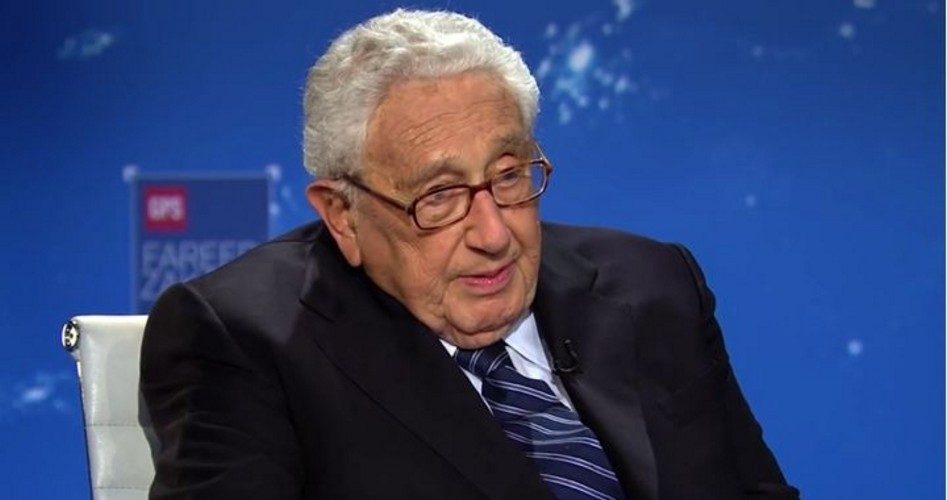
On Tuesday, president-elect Donald Trump — who campaigned on an anti-establishment platform — sat down with the quintessential establishment insider, Henry Kissinger (shown). The meeting is cause for concern. Kissinger is well-known as a self-avowed globalist. He is also a long-time member of the Council of Foreign Relations and has been involved in the Trilateral Commission — both of which are pro-globalist organizations. Both as secretary of state and since, his foreign policy has always favored his internationalist bent. He is also a regular attendee of the highly secretive — and entirely globalist — annual Bilderberger Conference.
Kissinger favors everything Trump campaigned against (and against everything Trump campaigned for). For instance, Trump has promised to stop the Trans-Pacific Partnership (TPP) and negotiate trade deals which favor American interests. TPP is the poisoned fruit that hangs from the branches of the poisoned tree of previous trade agreements, such as NAFTA. Kissinger famously said that NAFTA “represent[s] the most creative step toward a new world order taken by any group of countries since the end of the Cold War” and that it “is not a conventional trade agreement, but the architecture of a new international system.” Telegraphing the plans of the insiders to use NAFTA as a launching pad for bigger and broader agreements, such as TPP, Kissinger said at the time of the passage of NAFTA that it was the “first step toward an even larger vision of a free-trade zone for the entire western hemisphere.” Stopping TPP is necessary, but it is not enough. NAFTA must be dismantled, and the ground from which it sprang must be plowed under so that no root of that poisoned tree remains to spring up again later. That ground is internationalism, and Henry Kissinger is one of its chief gardeners.
Tuesday’s meeting between Trump and Kissinger is not the first between the two. In fact, it is at least the third such meeting since Trump began his bid for the White House. The two met in May, before Trump had even secured the GOP nomination. That meeting — requested by Trump — was held at Kissinger’s home and lasted about an hour. In that meeting, Trump appeared to be courting Kissinger’s approval or at least attempting to appear well-connected by being seen meeting with the granddaddy of foreign policy. The week before that, Trump met with another well-connected insider and former secretary of state, James Baker.
The week after winning the election, Trump again sat down with Kissinger. This time, the meeting was on Trump’s home court — Trump Tower. ABC News reported that Trump said he has “tremendous respect for Dr. Kissinger and appreciates him sharing his thoughts with me.” In a statement after the meeting, the presidential transition team said, “President-elect Trump and Dr. Kissinger have known each other for years and had a great meeting. They discussed China, Russia, Iran, the EU and other events and issues around the world.”
That Trump would either ask for or agree to a sit-down to discuss foreign policy with a man who has spent his life and built his career selling America out to build the “New World Order” is curious. That this is at least the third such meeting is concerning. That Trump has “tremendous respect for Dr. Kissinger” and “appreciates him sharing his thoughts” on matters related to “China, Russia, Iran, the EU and other events and issues around the world” is disturbing.
It is not known exactly what was discussed at this most recent meeting, but considering that relations with China is one of Kissinger’s pet projects, it seems likely that at least part of their time Tuesday was spent discussing trade and diplomatic relations with the communist dictatorship. In fact, this most recent meeting between Trump and Kissinger came just four days after the latter met with Xi Jinping, general secretary of the Central Committee of the Communist Party of China and China’s “president.”
On Monday — the day before meeting with Trump — Kissinger spoke of his meeting with Xi, which many saw as an attempt to smooth feathers that had been ruffled by Trump’s call to Taiwanese President Tsai Ing-wen last week. Since the United States values relations with China and China refuses to recognize Taiwanese independence, the United States has had no diplomatic relations with Taiwan nor “officially” recognized its independence since 1979. Trump’s call to Tsai was a departure from that policy, and Kissinger appears to have taken it upon himself to smooth things out. In that meeting, Xi told Kissinger that China was “watching the situation very closely.” At an event sponsored by the National Committee on U.S.-China Relations, Kissinger said that he was “very impressed at the calm reaction of the Chinese leadership, which suggests a determination to see whether a calm dialogue can be developed.”
Trump campaigned on an “America first” foreign policy and has maintained that he will deliver on that promise. In a campaign speech at Washington’s Mayflower Hotel in April, Trump called globalism a “false song” and said, “’America first’ will be the overriding theme of my administration.”




